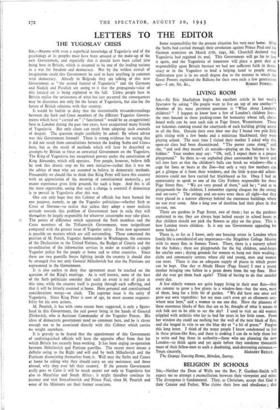LIVING ROOM
Sig,—Sir Eric Macfadyen begins his excellent article in last week's Spectator by asking " Do people want to live on top of one another? " Another of his most pertinent questions is "What about London's children? " I happen to know how a few of London's children live— the ones housed in those packing-cases for humanity whose tall, chess- board walls can be seen each side at Page Street, Westminster. There are balconies running round the courtyards of each building giving access to all the flats. Outside their own door one day I found two pale little girls sitting with a few books and a miniature blackboard, they were playing school. The next time I visited their mother I asked why this open-air class had been discontinued. " The porter came along," said she, " and said they mustn't sit outside—playing on the balcony is for- bidden." Your readers may say: " Oh, well, I expect there is a proper playground." So there is—an asphalted place surrounded by heavy and tall iron bars so that the children's balls can break no windows—like a cage for lions or bears at the Zoo—but only a very few mothers can get a glimpse of it from their windows, and the little 9-year-old school.. mistress could not have carried her blackboard so far. Once I had an opportunity to speak to one of the City Fathers responsible for those Page Street flats. " We are very proud of them," said he ; " and as to playgrounds for the children, I remember signing cheques for the swings and see-saws." The swings and see-saws were there all right=but they were placed in a narrow alleyway behind the enormous buildings where no sun ever came. Also a long row of dustbins had their place in that rat-run, too.
There are gardens in Page Street, two of them ; but as the gardener explained to me, they are always kept locked except in school hours so that children should not pick the flowers or play on the grass. This is how London treats children. Is it any use Government appealing for more babies?
There is, as far as I know, only one housing estate in London where family life is considered of any importance—the Magdalen College Mission with its many flats in Somers Town. There, there is a nursery school for the babies ; there are playgrounds for the big children, sand-heaps for smaller ones ; drying grounds for women to hang out their washing ; clubs and community centres where old and young, men and women can meet. There is also an adequate supply of places in which prams can be kept. One day at Abady House (Page Street) I met a young mother bringing two babies in a pram down from the top floor. How did she ever get them back again? Think of having to do that unaided every day.
A few elderly women are quite happy living in their neat flats—they are content to grow a few plants in a window-box—but the men, most of them, long for a little bit of garden. "We did have one once and grew our own vegetables: but my man can't even get an allotment any- where near here," said a woman to me one day. Have the planners of *these enormous blocks of fiats that are to be, thought of what it means to sick folk not to be able to see the sky? I used to visit an old woman crippled with arthritis who lay in bed for years in her little room. From her window she could see nothing but the wall of the next block of flats, and she longed in vain to see the blue sky or " a bit of green." Forgive this long letter. I think of the many people I know condemned to live in these prison-like flats, and there is nothing I can do to help them but to write and beg those in authority—those who are planning the new London—to think again and yet again before they condemn thousands more of their fellow-men to such a deadening, soul-destroying existence.— Yours sincerely, MARGERY REILLY. The Grange Nursing Home, Morden, Surrey.


























 Previous page
Previous page